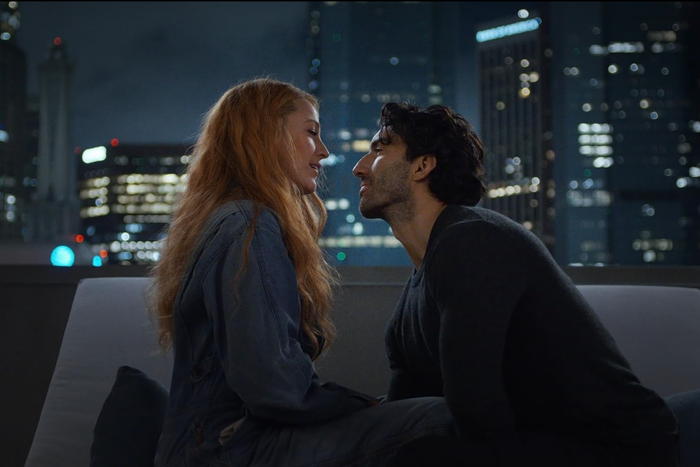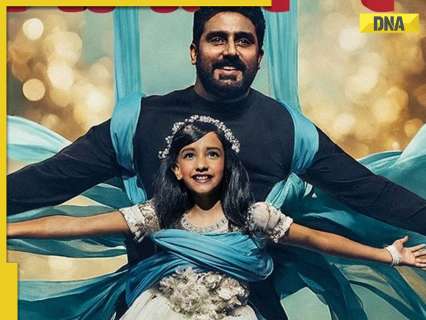It Ends With Us does not trade in subtleties. Visually, it is defined by sequined dresses and star Blake Lively’s gigantic crimson perm. Lively’s character, a florist named Lily Blossom Bloom, says the title of the film out loud .
.. twice.

But a big-screen adaptation of a Colleen Hoover novel is no place to look — or listen — for nuance. The soundtrack’s needle drops are used like narration, often conveying Lily’s emotional state more vividly than the script does. If you happen to run to the bathroom during a pivotal scene, don’t worry, some tune from Spotify’s Sad Girl Autumn playlist will catch you up on what you missed when you return.
Hoover’s book, which is loosely based on her own experiences with domestic violence growing up, was met with equal acclaim and derision when it was released in 2016. Some readers praised the way the author handled touchy subjects, while others claimed the story romanticized abusive relationships. While the film’s screenplay is crafted with a touch more grace than Hoover’s novel, its soundtrack is not.
And while some of those music cues might flirt with glamorizing the heavy topics at hand, the real risk here is taking the audience out of the movie entirely. It Ends With Us ’s song choices are all so literal that it’s difficult to choose which might be the most distracting. Is it the one that plays as the people onscreen start acting out the lyrics? The one sung by the lead actor’s mega-famous best friend? Maybe it’s the one about being devoured like smoked bovine hide? We sorted through them all, ranking each from least to most distracting, as a kind of guide for those with short attention spans.
Consider this a service for ...
sorry, where was I? Right. You’ve been warned. How’s it used? Ethel Cain’s 2022 cover of Britney Spears’s “Everytime” accompanies the end credits of the movie after Lily has sorted things out with her estranged husband, Ryle Kincaid (Justin Baldoni, also the film’s director ) and hooked back up with her teenage sweetheart, Atlas Corrigan (Brandon Sklenar).
Ryle is a guy whose violent anger issues caused him to lose Lily, and so Cain sings, “My weakness caused you pain.” Why we’re closing this film with Ryle’s perspective is anyone’s guess. How distracting is it? After two hours and ten minutes, the movie is now blessedly over, so technically there isn’t that much left to distract us from.
That makes this needle drop the least egregious offender, only about as distracting as trying to type an important email with a papercut. How’s it used? In one of the tensest scenes in the entire film, Ryle pins Lily down and kisses her aggressively while she begs him to stop. It’s difficult to watch, but then all of that tension is let out of the movie when Aldous Harding’s “Horizon” starts up.
Lily seeks refuge at Atlas’s apartment, and he cleans her wounds while Harding sings, “Let me put the water in the bowl for your wounds, babe.” This one’s so on the nose that it may as well be a freckle. How distracting is it? The song doesn’t take you out of the story entirely — it’s just weird to watch the actors onscreen reenacting Harding’s lyrics.
You can power through if you concentrate, the way you resist a free sample of aged gouda when you’re trying to get in and out of Trader Joe’s in a hurry. How’s it used? The soaring melodies of this song are perfectly suited to an establishing shot of the Boston skyline. They are less fitting, however, as a gentle illustration of a rocky relationship.
Lily discovers that Atlas is not only living in the same city as her, but also running one of the best new restaurants in town, where Lily’s best friend Allysa (Jenny Slate) announces her pregnancy. “My rose garden dreams are torn at the seams,” Del Rey moans while Lily, sporting a poorly concealed black eye, is torn between men. How distracting is it? The song will instantly take your mind off pregnant Jenny Slate and transport you to 2012, when everyone was mad at Del Rey for romanticizing the same subjects as Hoover’s book.
But the music is at least on theme with what’s happening in the movie. And, well, at least they didn’t go with “Ultraviolence.” How’s it used? The distinctly familiar coos of this cut from Swift’s Folklore play over a drone shot of autumnal Maine, as though Swift stipulated that her song could only be used in a scene befitting Folklore’s woodsy aesthetic.
Swift has said that “My Tears Ricochet” is about “an embittered tormentor showing up to the funeral of his fallen object of obsession.” So the song is used in a scene where Lily’s tormentor begs his wife to come home. “I can go anywhere I want, just not home,” Swift sings in the song’s bridge, which plays quietly in the background of this conversation.
How distracting is it? On the off chance you were being genuinely transported by the melodrama unfolding before you, Swift’s song comes as a sudden reminder that you are watching a film starring Blake Lively , and Blake Lively is the kind of star with megafamous friends like Taylor Swift . It’s quite disruptive, functioning like a Josie and the Pussycats– style subliminal message to buy all the Folklore variants. How’s it used? Another Ethel Cain needle drop comes during a scene where Lily stares out at the city from a rooftop, pensively pondering her passed papa’s pugnacity.
Cue Cain’s song about an abusive relationship that ends with its narrator being cannibalized and Ryle storming onto the roof and kicking a chair in anger. How distracting is it? Show me someone who can remain invested in what’s happening onscreen while Ethel Cain sings about being “devoured like smoked bovine hide” and I’ll show you a liar. How’s it used? “Love the Hell Out of You” absolutely thunders through the final frames of It Ends With Us as Lily and Atlas share a triumphant kiss.
It’s so loud that we simply have no choice but to believe what the movie is telling us: Atlas is going to love the hell out of her! Lily has escaped her assaulter — it did end with her! — but we viewers are assailed by the loudest song ever made. How distracting is it? This song lands like a jump scare right before the credits roll. It is as loud and as distracting as Lively’s four kids will surely be as she watches the Oscar nominations in early January with her fingers crossed.
How’s it used? Some couples go for “Islands in the Stream” when they get their hands on a pair of karaoke mics, but not Ryle and Lily! These crazy kids are queueing up Fatboy Slim’s 1998 big-beat hit, and we get to watch every single second of it. The song switches between being diegetic and non-diegetic, so we’re never quite sure if this rom-com karaoke scene is about to end or if we’re caught in an endless loop, doomed to watch these characters duet forever. Between shots of them singing, Ryle lovebombs Lily, praising her like he should.
How distracting is it? As distracting as remembering that Rita Ora finally secured a No. 1 hit (on the dance charts) with a cover of this song in 2023. How’s it used? Birdy’s 2011 bananees and avocadees cover of Bon Iver’s tender song about looking back at a failed relationship is wildly, jarringly appropriate for a flashback in which a younger Lily (Isabela Ferrer) rolls around in the sheets with young Atlas (Alex Neustaedter).
The song feels all the more maudlin when Lily’s father kicks her door in and throws Atlas to the ground, nearly beating him to death. It’s a wrenching moment and the film’s emotional climax — and then abruptly, it’s as if Lively, Hoover, Bon Iver, and Birdy are all talking to you at once, reminding you that this scene is set sometime in the early 2010s. How distracting is it? Focusing on the drama at hand becomes impossible as you’re realizing you can’t remember the last time you willingly listened to Bon Iver.
Is this how those people at the Kamala rally felt?.



















